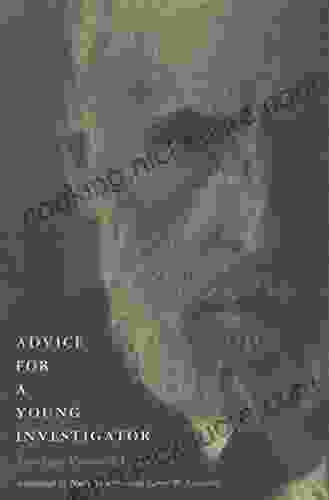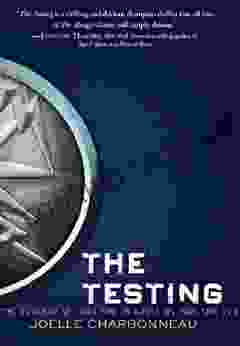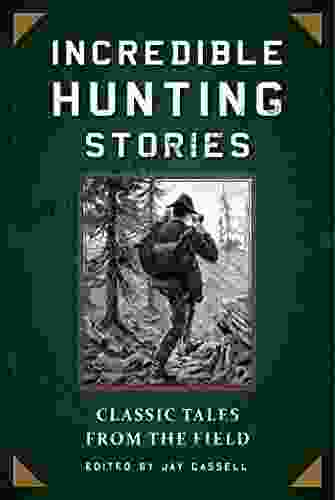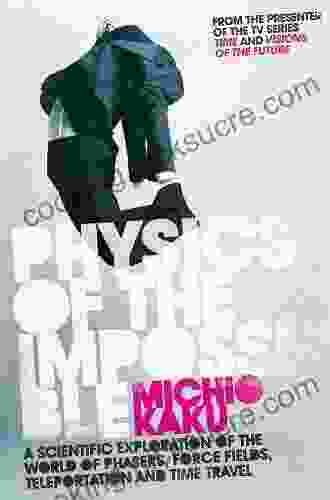Advice for Young Investigators: Empowering the Next Generation of Scientific Leaders

Embarking on a scientific career as a young investigator presents both immense opportunities and formidable challenges. Navigating the complexities of academia, securing funding, managing research teams, and achieving impactful outcomes requires a strategic approach and unwavering dedication.
4.7 out of 5
| Language | : | English |
| File size | : | 243 KB |
| Text-to-Speech | : | Enabled |
| Screen Reader | : | Supported |
| Enhanced typesetting | : | Enabled |
| Word Wise | : | Enabled |
| Print length | : | 306 pages |
This comprehensive guide aims to empower young investigators by providing invaluable advice and insights to maximize their potential, overcome obstacles, and make significant contributions to their respective fields.
Section 1: Building a Solid Foundation
The foundation of a successful scientific career is laid upon unwavering curiosity, passion, and intellectual rigor. Establishing a deep understanding of your research area is paramount. Engage in extensive literature reviews, attend conferences, and seek out mentors who can guide you and inspire your scientific endeavors.
Key Points:
- Identify your research interests and delve deeply into the existing literature.
- Seek out experienced mentors who can provide guidance and support.
- Attend scientific conferences to expand your knowledge and connect with peers.
Section 2: Secure Funding and Resources
Securing funding is essential to sustain research projects and advance scientific discoveries. Explore various funding opportunities, including grants from government agencies, private foundations, and industry partnerships. Develop compelling grant proposals that clearly articulate the significance and feasibility of your research.
Key Points:
- Identify potential funding sources and tailor your grant proposals accordingly.
- Clearly demonstrate the impact and innovation of your research.
- Collaborate with colleagues to enhance the strength and scope of your proposals.
Section 3: Building an Effective Team
As your research endeavors expand, assembling a talented and dedicated team becomes crucial. Seek out individuals with diverse expertise and complementary skill sets. Foster a supportive and collaborative work environment that encourages open communication and intellectual exchange.
Key Points:
- Recruit team members with complementary skills and a strong work ethic.
- Establish clear roles and responsibilities to ensure efficient teamwork.
- Create a positive and inclusive work environment that values diversity and collaboration.
Section 4: Publishing High-Impact Research
Communicating your research findings through peer-reviewed publications is vital for scientific recognition and impact. Identify reputable journals that specialize in your research area and carefully prepare manuscripts that adhere to their guidelines. Seek feedback from colleagues and mentors to enhance the quality and clarity of your writing.
Key Points:
- Choose journals that have a high impact factor and are relevant to your research.
- Prepare well-written manuscripts that are clear, concise, and scientifically rigorous.
- Collaborate with co-authors to strengthen the research and writing process.
Section 5: Managing Time and Resources
Effective time management is essential to balance the demands of research, teaching, and other professional commitments. Prioritize tasks, set realistic timelines, and delegate responsibilities when appropriate. Utilize technology and organizational tools to enhance efficiency. Maintain a healthy work-life balance to avoid burnout and sustain your productivity.
Key Points:
- Set clear priorities and allocate time accordingly.
- Learn to delegate tasks to team members.
- Take breaks and engage in activities that promote well-being.
Section 6: Collaboration and Networking
Scientific progress often occurs through collaborations and networks. Attend conferences, workshops, and seminars to connect with peers, exchange ideas, and identify potential collaborators. Seek opportunities to engage in interdisciplinary research that leverages diverse perspectives and expertise.
Key Points:
- Attend scientific events to expand your network.
- Build relationships with researchers from different institutions and disciplines.
- Explore opportunities for collaborative research projects.
Section 7: Outreach and Impact
Beyond publishing papers, young investigators should strive to make their research accessible and impactful to a broader audience. Engage in science communication and outreach activities to share your discoveries and inspire the next generation of scientists. Consider partnering with schools, museums, or community organizations.
Key Points:
- Communicate your research findings to non-scientific audiences.
- Participate in science outreach events and activities.
- Collaborate with educational institutions to inspire young minds.
Section 8: Career Development
Navigating the academic career path requires strategic planning and professional development. Seek opportunities for teaching, mentorship, and leadership roles. Consider pursuing further education or specialized training to enhance your knowledge and skills. Stay informed about career trends and emerging opportunities in your field.
Key Points:
- Explore teaching and mentorship opportunities.
- Pursue further education or specialized training to advance your career.
- Stay informed about career trends and emerging opportunities.
Embarking on a scientific career as a young investigator is an exciting and challenging journey. By embracing the principles outlined in this comprehensive guide, you can empower yourself to overcome obstacles, maximize your potential, and make significant contributions to the advancement of knowledge and society.
Remember, the path may not always be straightforward, but with perseverance, curiosity, and a strong support network, you can achieve your scientific aspirations and ignite a lifelong passion for discovery.
4.7 out of 5
| Language | : | English |
| File size | : | 243 KB |
| Text-to-Speech | : | Enabled |
| Screen Reader | : | Supported |
| Enhanced typesetting | : | Enabled |
| Word Wise | : | Enabled |
| Print length | : | 306 pages |
Do you want to contribute by writing guest posts on this blog?
Please contact us and send us a resume of previous articles that you have written.
 Fiction
Fiction Non Fiction
Non Fiction Romance
Romance Mystery
Mystery Thriller
Thriller SciFi
SciFi Fantasy
Fantasy Horror
Horror Biography
Biography Selfhelp
Selfhelp Business
Business History
History Classics
Classics Poetry
Poetry Childrens
Childrens Young Adult
Young Adult Educational
Educational Cooking
Cooking Travel
Travel Lifestyle
Lifestyle Spirituality
Spirituality Health
Health Fitness
Fitness Technology
Technology Science
Science Arts
Arts Crafts
Crafts DIY
DIY Gardening
Gardening Petcare
Petcare Garcilaso De La Vega
Garcilaso De La Vega Kelly Tyler Lewis
Kelly Tyler Lewis Elizabeth Clor
Elizabeth Clor Roberto Pedreira
Roberto Pedreira Terry Ann Williams Richard
Terry Ann Williams Richard Mira Kirshenbaum
Mira Kirshenbaum Robin Ha
Robin Ha Sarah Castille
Sarah Castille Jakub Marian
Jakub Marian Sandra Glosser
Sandra Glosser James E Wisher
James E Wisher Andrea Curtis
Andrea Curtis Michele Leathers
Michele Leathers Marissa Meyer
Marissa Meyer Brian Azzarello
Brian Azzarello Andrew Beyer
Andrew Beyer Tom Siegfried
Tom Siegfried David Borgenicht
David Borgenicht Peter Boardman
Peter Boardman Gwendolyn Griffith Lieuallen
Gwendolyn Griffith Lieuallen Kelly Oliver
Kelly Oliver Andrea Flores
Andrea Flores Keith Sutton
Keith Sutton Kirby Arnold
Kirby Arnold Wolfgang Hohlbein
Wolfgang Hohlbein Ian O Connor
Ian O Connor William Ritter
William Ritter Andrea Wachter
Andrea Wachter Katharine B Soper
Katharine B Soper Aldous Huxley
Aldous Huxley Martin Rooney
Martin Rooney Chris Lilly
Chris Lilly Jason Welker
Jason Welker Andrea Bemis
Andrea Bemis Andrew Brown
Andrew Brown Greg Ruth
Greg Ruth Wendy Heard
Wendy Heard Geoffrey Wolff
Geoffrey Wolff David Montgomery
David Montgomery C L Mississippi Morgan
C L Mississippi Morgan Doug Swisher
Doug Swisher Sue Fierston
Sue Fierston Christina Kim
Christina Kim Ryan Pellett
Ryan Pellett Susan Williams White
Susan Williams White Gabby Rivera
Gabby Rivera H Spencer Lewis
H Spencer Lewis Connie J Wells
Connie J Wells Nick Marshall
Nick Marshall Matt Richtel
Matt Richtel Erica Hoke
Erica Hoke Bettina Bonifatti
Bettina Bonifatti Karen Robson
Karen Robson Kiersten White
Kiersten White Gaurav Suri
Gaurav Suri Jim Shea
Jim Shea Brad Schoenfeld
Brad Schoenfeld Rob Taylor
Rob Taylor Jenna Miscavige Hill
Jenna Miscavige Hill Rick Heard
Rick Heard Mason Deaver
Mason Deaver Ronald W Doerfler
Ronald W Doerfler Tom Lodziak
Tom Lodziak Kevin Cook
Kevin Cook Vin T Sparano
Vin T Sparano Steven M Fiser
Steven M Fiser James Willstrop
James Willstrop Rupert Sheldrake
Rupert Sheldrake Meiso
Meiso Victoria Schwab
Victoria Schwab Milo Stewart
Milo Stewart Michael Hermann
Michael Hermann Eric Engle
Eric Engle Robyn Sheldon
Robyn Sheldon Paul Rooyackers
Paul Rooyackers Steven Arms
Steven Arms Bhavesh Mamtani
Bhavesh Mamtani Sunny Anderson
Sunny Anderson Rachel Meltzer Warren
Rachel Meltzer Warren Richard Bolstad
Richard Bolstad Thomas Meyer
Thomas Meyer M D Johnson
M D Johnson Richard Bellman
Richard Bellman Julie Powers
Julie Powers Baz Thompson
Baz Thompson Patsy M Lightbown
Patsy M Lightbown Jacqueline Edmondson
Jacqueline Edmondson Laura Domino
Laura Domino Kjartan Poskitt
Kjartan Poskitt Michael Anderle
Michael Anderle Richard N Aufmann
Richard N Aufmann Dana Mccullough
Dana Mccullough Melissa Reynolds
Melissa Reynolds Kristin Briney
Kristin Briney Elizabeth Marshall Thomas
Elizabeth Marshall Thomas Andre Watson
Andre Watson Lena Shev
Lena Shev Serena Valentino
Serena Valentino Isabel Sterling
Isabel Sterling Richard Munson
Richard Munson Jason Louv
Jason Louv Steven Johnson
Steven Johnson Whitney Nelson
Whitney Nelson Craig Custance
Craig Custance Kathryne Kennedy
Kathryne Kennedy James Mallory
James Mallory Future Publishing
Future Publishing Ben Doughty
Ben Doughty Michael Judge
Michael Judge Joe Wells
Joe Wells Kindra Gordon
Kindra Gordon David W Brown
David W Brown Galen Wolf
Galen Wolf L Michele Issel
L Michele Issel Ronald J Harshbarger
Ronald J Harshbarger Thomas Watson
Thomas Watson Dot Edu
Dot Edu Raymond Coppinger
Raymond Coppinger Joe Posnanski
Joe Posnanski Stephen Wiggins
Stephen Wiggins Mary Jane Sterling
Mary Jane Sterling Nathaniel Philbrick
Nathaniel Philbrick A J Carlisle
A J Carlisle David Abram
David Abram Greg Presto
Greg Presto Sean Pidgeon
Sean Pidgeon Rachel Hawkins
Rachel Hawkins Chris Salisbury
Chris Salisbury Rizwan Virk
Rizwan Virk Andrew Gelman
Andrew Gelman Steve Sheinkin
Steve Sheinkin Andrew Feinberg
Andrew Feinberg Lundy Bancroft
Lundy Bancroft Gary Thomas
Gary Thomas Big Daddy Ozone
Big Daddy Ozone Laurie Seale
Laurie Seale Julie Miller
Julie Miller Kristine Papin Morris
Kristine Papin Morris Marta Szabo
Marta Szabo 18th Edition Kindle Edition
18th Edition Kindle Edition Course Hero
Course Hero Andrew Doughty
Andrew Doughty Jack Purdum
Jack Purdum Robin Satty
Robin Satty Laura Lincoln Maitland
Laura Lincoln Maitland Terence Callery
Terence Callery William Gerin
William Gerin Bruce Mcnall
Bruce Mcnall Robin Mamlet
Robin Mamlet Malinda Lo
Malinda Lo John Morton
John Morton Lynne L Finch
Lynne L Finch Brian C Muraresku
Brian C Muraresku Andrea Olson
Andrea Olson Dayton O Hyde
Dayton O Hyde Luke Rosiak
Luke Rosiak Leslie Morgan Steiner
Leslie Morgan Steiner Melissa Caughey
Melissa Caughey Romney Steele
Romney Steele Jen Calonita
Jen Calonita Jennifer Blair
Jennifer Blair Jason Zemcik
Jason Zemcik Peter May
Peter May Joelle Charbonneau
Joelle Charbonneau Andrew Goliszek
Andrew Goliszek Timothy Johnson
Timothy Johnson Gregory Curtis
Gregory Curtis James A Middleton
James A Middleton Elizabeth S Meckes
Elizabeth S Meckes Brock Eide
Brock Eide Carrie Ryan
Carrie Ryan James R Morrow Jr
James R Morrow Jr Linda Eyre
Linda Eyre Bridget Portmann
Bridget Portmann Tony Herman
Tony Herman George E P Box
George E P Box Tim Wharnsby
Tim Wharnsby Raymond E Feist
Raymond E Feist Jay Greeson
Jay Greeson Brenda Reed Pilcher
Brenda Reed Pilcher W J Hendry
W J Hendry Rich Luhr
Rich Luhr J David Logan
J David Logan Nikola Tesla
Nikola Tesla Tillie Walden
Tillie Walden Anna Holmwood
Anna Holmwood Kylie Lee Baker
Kylie Lee Baker Tim Ryan
Tim Ryan Ruby Walker
Ruby Walker Steven H Weintraub
Steven H Weintraub Daniel Shiffman
Daniel Shiffman Gerald A Moore Sr
Gerald A Moore Sr Mark Hume
Mark Hume Pliny The Elder
Pliny The Elder Jack Hunnicutt
Jack Hunnicutt Bruce D Perry
Bruce D Perry Zak Mt Standridge
Zak Mt Standridge Lars Muhl
Lars Muhl Nic Oatridge
Nic Oatridge Hayley Campbell
Hayley Campbell Rick Westhead
Rick Westhead James Branch Cabell
James Branch Cabell Ivan Pastine
Ivan Pastine Mark M Meerschaert
Mark M Meerschaert Roger Atwood
Roger Atwood Kenneth S Shultz
Kenneth S Shultz Simon Garfield
Simon Garfield Annette Curtis Klause
Annette Curtis Klause Benedict Carey
Benedict Carey Kelsie Stelting
Kelsie Stelting Ed Willes
Ed Willes David Scott
David Scott Ken Blanchard
Ken Blanchard Karen Tranberg Hansen
Karen Tranberg Hansen James Rebanks
James Rebanks George Christian Pappas
George Christian Pappas Lori Shandle Fox
Lori Shandle Fox Mara Vorhees
Mara Vorhees Andrea Komlosy
Andrea Komlosy Ricky Moore
Ricky Moore Andrea Cremer
Andrea Cremer Guillermo Ferrara
Guillermo Ferrara 24th Edition Kindle Edition
24th Edition Kindle Edition Tamara Ireland Stone
Tamara Ireland Stone Paul Abell
Paul Abell Marvin L Bittinger
Marvin L Bittinger Cliff Wilson
Cliff Wilson Victoria Ortiz
Victoria Ortiz Kerri Andrews
Kerri Andrews Lucia Ashta
Lucia Ashta James Turnbull
James Turnbull Jamie Ivey
Jamie Ivey Christos Lynteris
Christos Lynteris Antonio Iturbe
Antonio Iturbe Florent Buisson
Florent Buisson Jessica Mccrory Calarco
Jessica Mccrory Calarco Mandy Baggot
Mandy Baggot Paul Kalas
Paul Kalas J E Lendon
J E Lendon Charles H Hapgood
Charles H Hapgood Robin Hobb
Robin Hobb Christopher Sommer
Christopher Sommer Nancy B Rapoport
Nancy B Rapoport James Lyons Weiler
James Lyons Weiler Cathal Armstrong
Cathal Armstrong Jimmy Elliott
Jimmy Elliott Sorin Dumitrascu
Sorin Dumitrascu Joe Cavallaro
Joe Cavallaro Gabrielle Coleman
Gabrielle Coleman Usa Pickleball Association
Usa Pickleball Association James Geary
James Geary Dylan Norton
Dylan Norton Sara Manning Peskin
Sara Manning Peskin James Dodson
James Dodson Jed Z Buchwald
Jed Z Buchwald Nick Peters
Nick Peters Paul Stamets
Paul Stamets Jordan Romero
Jordan Romero Joseph Luzzi
Joseph Luzzi Mike Davenport
Mike Davenport Janet Wolanin Alexander
Janet Wolanin Alexander Anne Holler
Anne Holler Charlotte Elkins
Charlotte Elkins Joseph Bruchac
Joseph Bruchac Will Thornton
Will Thornton Ben Orlin
Ben Orlin Jim Curran
Jim Curran Gemma Rogers
Gemma Rogers Roland Martin
Roland Martin Joseph Ledoux
Joseph Ledoux Robert Bacal
Robert Bacal Michio Kaku
Michio Kaku Peter Mcbride
Peter Mcbride Minal Hajratwala
Minal Hajratwala C B Lee
C B Lee Peter David
Peter David Robert Hamill
Robert Hamill Francesca Zappia
Francesca Zappia Lisa Bond
Lisa Bond Stuart L Kaplan M D
Stuart L Kaplan M D Ken Gullette
Ken Gullette Riley Black
Riley Black Kailin Gow
Kailin Gow Victoria Allman
Victoria Allman Tom Lecompte
Tom Lecompte Suzy Ashworth
Suzy Ashworth Adam Mansbach
Adam Mansbach Kathleen Dean Moore
Kathleen Dean Moore Ronald D Davis
Ronald D Davis Rashers Tierney
Rashers Tierney Prasad Raju V V N R Pathapati
Prasad Raju V V N R Pathapati Maria Konnikova
Maria Konnikova Andrea Gonzales
Andrea Gonzales Gillian Tett
Gillian Tett Clayton Everline
Clayton Everline Necoco
Necoco Ola Ola
Ola Ola C L Werner
C L Werner Patrick Mouratoglou
Patrick Mouratoglou Mara Rockliff
Mara Rockliff Ralph Zuranski
Ralph Zuranski Sameera Khan Rd Pa C
Sameera Khan Rd Pa C Laurie Ann Thompson
Laurie Ann Thompson Joseph Terry
Joseph Terry Mike Cyra
Mike Cyra Laird Hamilton
Laird Hamilton Becky Lomax
Becky Lomax Frans De Waal
Frans De Waal Rob Summers
Rob Summers Rashid Khalidi
Rashid Khalidi Steven Poses
Steven Poses Andrew Blauner
Andrew Blauner Sarah Outen
Sarah Outen Michael S Malone
Michael S Malone Lilith Starr
Lilith Starr Andrea Cataldo
Andrea Cataldo Elizabeth S Trafalgar
Elizabeth S Trafalgar Seth Reichelson
Seth Reichelson Richard P Feynman
Richard P Feynman Tracy Townsend
Tracy Townsend Nancy Mather
Nancy Mather Jennifer Anne Davis
Jennifer Anne Davis Dani Jacobs
Dani Jacobs George Hospodar
George Hospodar Dr Gabriel Peter Salgo
Dr Gabriel Peter Salgo S Fatou
S Fatou Steve Caplin
Steve Caplin Rita Jablonski
Rita Jablonski Jeff Davis
Jeff Davis Neil Oliver
Neil Oliver Donna Bollinger
Donna Bollinger Jefferson Hawkins
Jefferson Hawkins Ann Gadzikowski
Ann Gadzikowski Ian Tattersall
Ian Tattersall Leslie Vedder
Leslie Vedder Daniel Humm
Daniel Humm Loren Pope
Loren Pope Robert Sky Allen Ph D
Robert Sky Allen Ph D Morihei Ueshiba
Morihei Ueshiba Stephen Chbosky
Stephen Chbosky Jennifer L Armentrout
Jennifer L Armentrout Kyle Keegan
Kyle Keegan Patrick Hatt
Patrick Hatt Deaver Brown
Deaver Brown Chiara Marletto
Chiara Marletto Jim Apfelbaum
Jim Apfelbaum Andrew Duncan
Andrew Duncan Bernard Craw
Bernard Craw Mark Mcconville
Mark Mcconville Arianna Astuni
Arianna Astuni Catherine Montgomery
Catherine Montgomery Jonathan Cummings
Jonathan Cummings Leslie Sokol
Leslie Sokol Steve Bisheff
Steve Bisheff Bill O Neill
Bill O Neill Catie Czora
Catie Czora Bobby Orr
Bobby Orr Jenn Brandt
Jenn Brandt William F Sensakovic
William F Sensakovic Kristen Thone
Kristen Thone Linda Anne Silvestri
Linda Anne Silvestri Wildlife Trusts
Wildlife Trusts Claire Maxted
Claire Maxted Metin Bektas
Metin Bektas Donald S Murray
Donald S Murray Jenny Mackay
Jenny Mackay Bisco Hatori
Bisco Hatori Erich Neumann
Erich Neumann Dorothy Pang
Dorothy Pang Galit Shmueli
Galit Shmueli Shane Ryan
Shane Ryan Peter Scazzero
Peter Scazzero Brandon Mull
Brandon Mull Jaak Panksepp
Jaak Panksepp D Harvey
D Harvey Emily Henry
Emily Henry Josh Tabor
Josh Tabor Bernard A Chavis
Bernard A Chavis Anne Marie Meyer
Anne Marie Meyer Stephanie Cacioppo
Stephanie Cacioppo Mary Keith Piasecki
Mary Keith Piasecki Andrew St Pierre White
Andrew St Pierre White Matt Fulks
Matt Fulks Tod Schimelpfenig
Tod Schimelpfenig Trish Allison
Trish Allison Hugh Raffles
Hugh Raffles Walter Greiner
Walter Greiner Richard Heinberg
Richard Heinberg Noel Janis Norton
Noel Janis Norton Jay Annelli
Jay Annelli Bonita Norris
Bonita Norris Rolf Potts
Rolf Potts Eugene Raikhel
Eugene Raikhel Marcus Felson
Marcus Felson Robert H Miller
Robert H Miller Giada De Laurentiis
Giada De Laurentiis Andrew Greiner
Andrew Greiner Candace Clark Trinchieri
Candace Clark Trinchieri Nancy Mcwilliams
Nancy Mcwilliams Rachel Atwood
Rachel Atwood Luke Hohmann
Luke Hohmann Shaun Assael
Shaun Assael Andrea Hudy
Andrea Hudy Lauren Daniels
Lauren Daniels Hampton Sides
Hampton Sides Sheila Jasanoff
Sheila Jasanoff Carmen Micsa
Carmen Micsa George Mahood
George Mahood Leisy J Abrego
Leisy J Abrego Charles Szypszak
Charles Szypszak Buster Benson
Buster Benson Arous Brocken
Arous Brocken John Gilbert
John Gilbert Andy Bull
Andy Bull Sandy Stott
Sandy Stott John Bantin
John Bantin April Vahle Hamel
April Vahle Hamel Lonely Planet
Lonely Planet Rajani Katta
Rajani Katta Steve Scott
Steve Scott Thomas S Kuhn
Thomas S Kuhn Stacey Little
Stacey Little Jonathan Clements
Jonathan Clements Paco Underhill
Paco Underhill Denise Riebe
Denise Riebe Joey Miller Msw Lcsw
Joey Miller Msw Lcsw Namina Forna
Namina Forna Christine Balaz
Christine Balaz Michael T Nygard
Michael T Nygard Frances Evesham
Frances Evesham Richard Maury
Richard Maury Marcus A Pfeiffer
Marcus A Pfeiffer Ewen Levick
Ewen Levick Anne Bogel
Anne Bogel Margaret Thorsborne
Margaret Thorsborne Caren Van Slyke
Caren Van Slyke Samantha Rodman
Samantha Rodman Paulette F C Steeves
Paulette F C Steeves Barbara Merry
Barbara Merry Steve Anthony Tallon
Steve Anthony Tallon Thomas Berger
Thomas Berger Pat Wray
Pat Wray Sudhir Shirwadkar
Sudhir Shirwadkar Bruce Bowlen
Bruce Bowlen Jeremy Freese
Jeremy Freese Andrej Spec
Andrej Spec Department Of Defense
Department Of Defense V E Schwab
V E Schwab Jon Gillespie Brown
Jon Gillespie Brown Stephan J Guyenet
Stephan J Guyenet James Fox
James Fox Robert Jay Lifton
Robert Jay Lifton Arlo Adams
Arlo Adams Christian Keur
Christian Keur Pietro Matracchi
Pietro Matracchi Leigh Bardugo
Leigh Bardugo Daniel P Murphy
Daniel P Murphy Christine Heppermann
Christine Heppermann Patrick W Galbraith
Patrick W Galbraith Stan Tekiela
Stan Tekiela Vertamae Smart Grosvenor
Vertamae Smart Grosvenor Luigi Gabriele Conti
Luigi Gabriele Conti Pete Pfitzinger
Pete Pfitzinger Susanna Kearsley
Susanna Kearsley Steven J Matthiesen
Steven J Matthiesen Mike Gauthier
Mike Gauthier Robert B Yonaitis
Robert B Yonaitis Harriet Brown
Harriet Brown Chris Mcmullen
Chris Mcmullen John Ramirez
John Ramirez Marta Obiols Llistar
Marta Obiols Llistar Sid Thatte
Sid Thatte Oliver Perkins
Oliver Perkins David Alloway
David Alloway Hasok Chang
Hasok Chang Bob Mayer
Bob Mayer Bernard Moitessier
Bernard Moitessier E K Johnston
E K Johnston Rachael Chapman
Rachael Chapman
Light bulbAdvertise smarter! Our strategic ad space ensures maximum exposure. Reserve your spot today!
 Ronald SimmonsFollow ·18.5k
Ronald SimmonsFollow ·18.5k Efrain PowellFollow ·16.1k
Efrain PowellFollow ·16.1k Tyrone PowellFollow ·17.1k
Tyrone PowellFollow ·17.1k Dashawn HayesFollow ·8.5k
Dashawn HayesFollow ·8.5k Jamison CoxFollow ·6.6k
Jamison CoxFollow ·6.6k Noah BlairFollow ·4.9k
Noah BlairFollow ·4.9k Tyler NelsonFollow ·12.4k
Tyler NelsonFollow ·12.4k Theodore MitchellFollow ·12.3k
Theodore MitchellFollow ·12.3k

 Demetrius Carter
Demetrius CarterGolf Scrimmages: Realistic Practice Games Under Pressure
Golf scrimmages are...

 Andres Carter
Andres CarterAhsoka Tano: The Force-Wielding Togruta Who Shaped the...
Ahsoka Tano is one of the most...

 Greg Foster
Greg FosterUndeath Ascendant: A Blood-Soaked Literary Odyssey into...
Immerse yourself in a macabre tapestry of...

 Paulo Coelho
Paulo CoelhoHow an English Polymath and French Polyglot Discovered...
The Rosetta Stone is...
4.7 out of 5
| Language | : | English |
| File size | : | 243 KB |
| Text-to-Speech | : | Enabled |
| Screen Reader | : | Supported |
| Enhanced typesetting | : | Enabled |
| Word Wise | : | Enabled |
| Print length | : | 306 pages |















